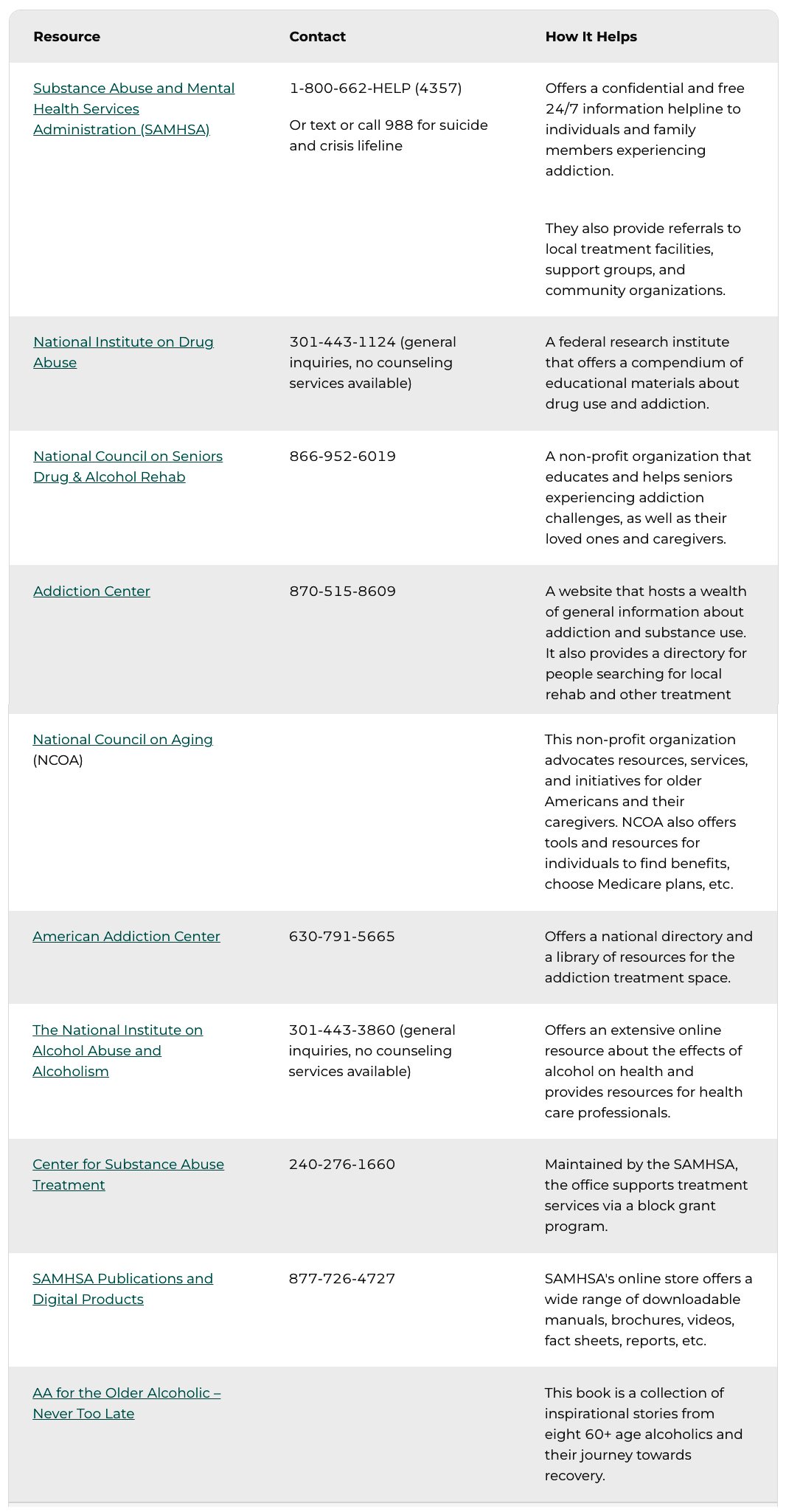
Assisted living options for people struggling with addiction
This story was produced by Caring.com and reviewed and distributed by Stacker.
Assisted living options for people struggling with addiction
If you or someone you love and care for experiences a substance use disorder, you are not alone. People may have navigated addiction for decades or experienced these challenges later in life. According to the National Institute on Alcohol Abuse and Alcoholism, 17% of adults over the age of 65 live with substance use disorders.
Seniors with substance use challenges can benefit from assisted living facilities, or ALFs. Viable options include facilities that support senior addiction treatments and/or host in-house meetings for Alcoholics Anonymous, or AA, or Narcotics Anonymous, or NA. Caring.com shares details on finding the right assisted living facility for people experiencing addiction with this helpful guide.
Key Takeaways
- Roughly 17% of older adults experience addiction challenges.
- For those managing their addiction, an ALF may be a good living option.
- Some ALFs may feature AA or NA meetings for seniors facing addiction challenges.
- Seniors can pay for their ALF costs with various financial options, including Medicare, Medicaid, long-term care insurance, and private funding.
What Is Assisted Living?
Seniors of all health levels can explore options like independent living and memory care facilities. Assisted living offers long-term residential settings that may appeal to older adults who need help with activities like bathing, dressing, housekeeping, laundry, and shopping.
ALFs offer services to help with activities of daily living, or ADLs, but do not provide round-the-clock medical care. A nursing home may be a better choice for those who need more extensive care. If a person is still fairly independent but needs regular care for an illness or injury, assisted living may work for them, possibly with the addition of a home health aide hired to supplement the facility's staff.
Cost of Assisted Living
Assisted living costs vary widely depending on location, living space size, amenities, and staff. According to Caring.com's proprietary senior living cost data, the average cost of assisted living is $4,200 a month, which amounts to $50,400 annually. If that figure seems out of reach, there may be financial options that can help cover some of the costs.
When Should Someone With a Substance Use Disorder Consider Assisted Living?
Assisted living communities are not substance use rehabilitation facilities. For people who need this type of help, consulting with their medical team can be useful to find the best recovery setting. For those who manage their addiction and no longer need acute recovery care, assisted living may offer an ideal option.
Most assisted living communities offer help with the following assistance with the following ADLs:
- Bathing
- Toileting
- Daily grooming
- Housekeeping chores
- Medication management
- Transportation for appointments and personal errands
- Basic mobility
An assisted living facility provides a secure and safe space for people, with little to no access to illicit substances. In some cases, on-site support services can aid in recovery. Some providers also offer transportation to off-site counseling services.
Who Isn't a Good Fit for Assisted Living?
Individuals in relatively good health who can take care of themselves without any additional assistance are not good candidates for assisted living. These individuals can consider independent living communities and active adult communities. Seniors who need 24-hour supervision will likely benefit from skilled nursing communities.
It's important to note that any addiction services provided by senior living staff, regardless of the facility type, will not be as intensive as those provided at a dedicated rehabilitation facility. Because of this, assisted living communities and other senior care communities are not appropriate as the first step to recovery. But, they can be a great source of ongoing support for someone who has battled addiction in the past.
Benefits of Assisted Living for Seniors with Addiction
Addiction in seniors isn't a widely discussed issue, and as a result, most assisted living facilities do not openly advertise their ability to help people with addiction. However, assisted living communities can be great environments for individuals living with addiction. Below are some of the most notable benefits:
Supportive environment: One of the biggest issues for seniors, especially those who have suffered a loss, is that they are isolated and alone, relying on a substance such as alcohol to cope with their feelings. Assisted living facilities offer opportunities for positive interactions with other seniors and staff members.
Supervised medications: In most assisted living facilities, all medications are in a locked cabinet that only staff can access. This policy ensures residents will only receive the right dosage of medication on the correct schedule.
Trained staff: In some cases, assisted living communities will have trained staff, such as counselors, nurses, psychologists, and social workers, to handle addiction.
Limited alcohol access: Seniors with alcohol addiction can benefit from controlled menus at meals. Most assisted living facilities don't serve alcohol with meals, and if they do, seniors consume it under the supervision of staff in a controlled environment. Staff make sure that residents with addiction challenges are not served alcohol.
Exercise and wellness programs: All residents can benefit from exercise and wellness programs at assisted living facilities, including people experiencing addiction. Physical activity has been shown to reduce addictive cravings and can help improve overall health.
Transportation: Some seniors with addiction may need to visit an off-site counselor or outpatient rehab facility. Assisted living communities can provide transportation to and from medical appointments, making it easier for residents to get the help they need.
What to Look For When Choosing an Assisted Living Facility for Seniors with Addiction
Because no two assisted living communities are exactly alike, it's important to visit several different facilities and get a good feel for what life is like there. While they may offer similar amenities, some are a better fit than others.
While visiting, don't hesitate to ask staff members any questions. Be on the lookout for things like:
Certified Staff
Seniors struggling with addiction will have different mental and physical health needs than other seniors. Check if the facility has certified staff members and caregivers qualified to provide this specialized care and treatment for seniors struggling with addiction.
Medication guidelines
Many ALFs offer medication management. Ask about their medication policies. Will they let residents handle their medications and retain their independence? Can you request verbal reminders for daily medications?
Counseling services
Ask if the facility has in-house counseling services or if your loved one has to visit an off-site practitioner. Counseling provides the necessary support system for seniors recovering from addiction and substance abuse.
Transportation services
Can the ALF provide transportation to get residents where they need to go? Whether to visit an off-site practitioner, make medical appointments, or go on shopping trips, an affordable and reliable means of transportation for residents is a must.
Group programs
Research shows that individuals experience better health outcomes when treated among their peers. Group programs help encourage residents to socialize, and some facilities form support groups for seniors facing issues like loss and addiction.
Alcohol restrictions
Every facility will have different policies regarding alcohol. Some ALFs allow seniors to consume alcohol and may have areas set aside for those wishing a drink. For recovering alcoholics, it's best to find a facility that bans any form of alcohol.
Mental health resources
Good mental health is vital to seniors, and it's especially critical for individuals recovering from addiction and substance abuse. Find out what kind of support and resources are available to help promote mental health.
Financial Support Options for Assisted Living
The average cost of assisted living, based on Caring.com's research, is $4,200 a month. Many seniors pay for this cost by pulling together multiple financial resources, revenue streams, and possibly government aid. These may include the following:
- Medicare: This federally-funded program won't pay for room and board but may cover qualified healthcare costs incurred in an assisted living facility, such as treatment costs for addiction recovery services.
- Medicaid: Seniors with limited financial resources may be eligible for Medicaid, which provides help for assisted living for alcoholics and others for nearly one in five ALF residents. Medicaid programs vary from state to state, and the application process can be lengthy.
- Veterans benefits: If you served in the military, there may be several benefits to help you, including your pension, the VA's alcohol and drug rehabilitation program, Aid & Attendance programs, and VA residential care options. Contact your local VA office for more information.
- Long-term care insurance: A long-term care insurance policy may cover in-home care, medical equipment, respite care, and memory care. It may, however, exclude care for drug or alcohol treatment for seniors, so check your policy documents or talk to an agent to understand your coverage.
- Private payment: Many seniors use at least some private funding to pay for assisted living, including social security, pensions, investment income, asset sales, and funding from family members.
- Life insurance cashout / accelerated death benefit: You may be able to tap into your life insurance policy's cash value if you have a permanent type of coverage, such as whole life or universal life. You may be able to sell the policy, take a loan from the cash value, or access an accelerated death benefit if your policy contains this endorsement. An ADB is generally available if you are living with a terminal illness, permanent disability, or other serious illness.
Where to Get Help If You're Experiencing Addiction

Bottom Line
Living with an addiction to drugs or alcohol can be a serious challenge. But for older adults, senior addiction treatments exist that can help—and assisted living for alcoholics and drug addicts may offer a viable living option. Some facilities offer AA meetings or other resources, and most will provide transportation to off-site treatment. Although assisted living facilities are not treatment centers, seniors successfully managing their addiction challenges may want to consider moving to ALFs.
Frequently Asked Questions
How can you help someone who has an addiction problem?
Helping a senior with an addiction requires a compassionate, supportive, and well-informed approach. Learning about addiction can help—the list of resources above is a good place to start. Offer support to your loved one without judgment, and encourage them to seek the professional help they need to recover.
What is the most common support group for addicts?
Possibly the most common support groups for addicts are Alcoholics Anonymous and Narcotics Anonymous. These two groups use the same model, based on a 12-step program emphasizing personal responsibility and group support. Both groups have a strong network of global meetings and may gather in assisted living or other senior living facilities.
What's the difference between senior rehab and assisted living?
The two living options differ in the level of care they offer. Senior rehab facilities focus on short-term medical and rehabilitative services for seniors recovering from surgery or illness. They are likely to feature skilled nursing and 24/7 medical care. Assisted living facilities are more suited to seniors who may need help with daily activities but do not require round-the-clock, intensive medical care.



